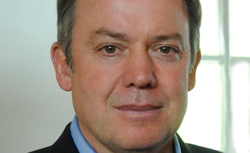Michael Crow, President, Arizona State University
The man who is trying to remake the American public university.
American universities think they're doing well. As evidence, they point to selective admissions and arcane scholarship. Michael Crow thinks they're grading themselves too easily. He worries about broader indicators of society's health: declining educational attainment, shrinking wages, environmental degradation. These are the standards by which universities should be judged. They need to worry less about who gets in and more about what comes out.
Crow wants to reconnect higher education to the real world. First at Iowa State, then at Columbia, and now at Arizona State University, he has pushed scholars to think like public servants and work like entrepreneurs. That means "use-inspired" teaching and research focused on local and global outcomes. More students admitted and educated. More graduates who are socially and economically productive.
To reach those goals, Crow tries lots of strategies. At ASU, the nation's youngest major research institution and the largest university governed by a single administration, one of four campuses is a polytechnic that emphasizes practical experience and direct entry into the workforce. Online teaching platforms leverage the faculty's reach. Accelerated curricula shorten the time required for a degree. Crow encourages employees to float and test ideas. At Columbia and ASU, he has pulled professors out of departmental silos and assembled them in multidisciplinary institutes where they share insights and different ways of thinking to solve complex challenges. He also builds collaborative networks with industry so that researchers can turn their work into useful products or processes, and through "academic enterprise" generate revenue for the university.
Under Crow, ASU has become an experiment in organizational evolution. There's a Biodesign Institute where scholars apply insights from the study of nature to renewable energy and national security. There's a College of Nursing and Health Innovation where architects and business faculty help to rethink health care. There's a School of Sustainability where faculty from dozens of academic fields collaborate to tackle water, energy, and urban development challenges in Arizona and the Southwest.
These experiments are still unfolding, but the bottom line looks good. Since Crow's arrival, ASU's research funding has almost tripled to nearly $350 million. Degree production has increased by 45 percent. And thanks to an ambitious aid program, enrollment of students from Arizona families below poverty is up 647 percent. ASU is finding ways to serve the broader public within and beyond its classrooms. The question now is how many other universities will follow suit.
Disclosure: Arizona State University, Slate, and the New America Foundation are partners in Future Tense, a collaborative series of conferences and articles.
Check out the rest of our government Top Right:
David Bossie, chairman and president, Citizens United
Jonathan Gruber, professor of economics, MIT
Gen. James Mattis, USMC
Janette Sadik-Khan, New York City transportation commissioner


